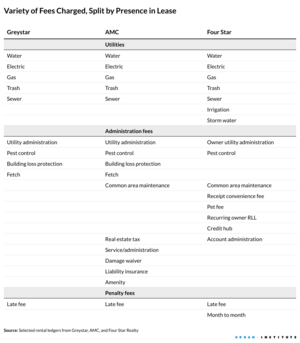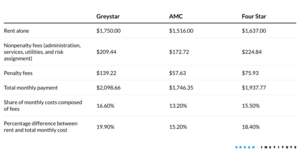
Westend61, Getty Images
Rental Junk Fees Are Harming Renters
The original version of the second table incorrectly showed a 19.2% difference between rent and total monthly cost for AMC. The correct value is 15.2% (corrected 5/1/2025).
Rental junk fees—or the hidden or unnecessary charges added to base rent to cover a range of costs (PDF) like application fees, utility administration fees, payment surcharges, pet fees, and late fees—are often arbitrary and unpredictable. They change renters’ expected base rate in ways that may be harmful and predatory. One lawsuit against Greystar alleges these fees inflate base rent and are extractive.
Yet capturing these data in a standardized and comprehensive way makes understanding junk fees’ effects and prevalence challenging. To explore what junk fees are, how they affect overall monthly costs, and what the implications are for policy and practice, the Urban Institute and the Community Economic Defense Project analyzed a small number of randomly selected rental ledgers from three housing providers in Denver, Colorado. We focused on a subset of larger landlords, which appear to be more likely to apply junk fees. Our findings confirm junk fees are unpredictable, add significantly to renters’ monthly costs, and can cause housing instability. State policymakers have some tools to reduce the harms.
Rental fee types vary substantially
For this review, we use information from rental ledgers and the associated leases to assess base rent, administrative charges, and penalty fees over a two-to-three-month lease period and compare the added charges with the fees outlined in the lease agreements. We define base rent as the monthly amount in the lease contract. Administrative charges are the nonrent, nonpenalty fees listed in the ledger, including common area maintenance, utility administration charges, package delivery fees, and traditional utilities (water, gas, and sewer), among others. Penalty fees are charges associated with late or missed payments and include late fees, notice posting fees, attorneys charges, and other penalties.
The types of fees charged to renters vary by landlord but are nominally tied to costs historically paid by landlords, factored into monthly rent, or contracted separately by renters. We observed charges in Greystar, AMC, and Four Star Realty ledgers. Although utility costs are relatively standard across organizations, the administrative fees vary widely and are often for unclear items such as “recurring owner RLL” or “receipt convenience fee.”

These charges are not substantiated to the renters who pay them—meaning landlords have no requirement to prove these fees are being paid to a vendor—and may, or may not, be tied to actual operational costs. Not included in the ledgers but included in many landlord agreements is an online surcharge fee that corresponds to about 1 to 3 percent of the total payment cost. Many of these fees are not disclosed in marketing materials or lease agreements. In some cases, lease agreements include blanket “catch-all” provisions that require tenants to assume all operating costs associated with their unit, such as administrative fees, but they aren’t specifically outlined or enumerated in the lease agreement. Many of these charges appear to represent a shift in landlords’ total pricing power.
Junk fees are a substantial component of total monthly costs
Findings show that fees increase tenants’ total monthly housing cost and can vary significantly month to month. Almost all large housing providers charge significantly more than the base rent. Across the ledgers included in our small sample, nonrent fees added 10 to 30 percent to renters’ total monthly costs.
Worse, tenants struggling to make payments are subject to more fees. Renters who are delayed in making a payment, behind on rent, or facing initial eviction proceedings, pay additional fines that constitute 5 to 10 percent of base rent.

Junk fees add cost and unpredictability to renters and cause instability
Junk fees make it harder to understand monthly costs when signing a lease, with many renters assuming the listed rent is the monthly grand total owed to the landlord. Even when tenants understand the cost structure of their lease, monthly variations can cause unexpected strain and limit tenants’ ability to predict and pay their monthly housing payments.
The opaque, variable nature of nonrent fees can be particularly harmful for renters with low incomes who are already housing cost burdened. If tenants are rent burdened or extremely rent burdened, an extra $100 in unexpected junk fees can disrupt a budget and lead to a missed rental payment and the inability to pay for essentials like food or child care. Late or partial payments trigger additional penalty fees and legal costs, eviction lawsuits, trips to court that take time away from work, and, in some cases, the loss of a home. In this way, junk fees may also increase the risk of eviction, displacement, or a negative credit report.
In some places, emergency rental assistance programs pay both rent and fees to stabilize tenancies, increasing these programs’ costs. Some landlords may apply payments to fees before base rent, which could leave tenants vulnerable to eviction even after receiving emergency support.
Large, unexplained fees represent new challenges for renters. Landlords are able—and perhaps encouraged—to make tenants cover the administrative costs of maintaining certain rental platforms, submit rent in certain ways (which may even be mandated by the landlord), and pay for a range of services that were once considered optional, such as trash valet service.
Policymakers can focus on encouraging transparency and reducing harm
Several states have introduced policies intended to limit the pervasive use of junk fees and their negative effects on renters. Others who want to mitigate the harms on renters can consider these policies or steps.
- Require price transparency: In some states, lawmakers are considering legislation that requires clear, upfront disclosure of all possible charges, fees, and penalties at the time a lease is signed. By establishing a single rent price, or transparency around associated variable costs, renters can better evaluate lease agreements.
- Prohibit catch-all cost transfer clauses: In cases where they aren’t already illegal, states should prohibit lease provisions that assign all utility and operational costs not specifically assumed by landlords to tenants.
- Ban mandatory services and amenities: Policymakers can also control unpredictable junk fees by prohibiting landlords from making optional services a mandatory part of the lease agreement. Tenants who do not want to purchase valet trash service, package delivery assistance, and related services should not be required to do so.
- Disallow evictions for unpaid fees or nonrent charges: Under many states’ landlord-tenant laws, a landlord can still file an eviction for unpaid administrative or penalty fees even when base rent is paid. State policymakers can limit the impact of junk fees on renter stability by allowing landlords to evict only for unpaid rent and by requiring rental payments to be applied to rent before junk fees.


